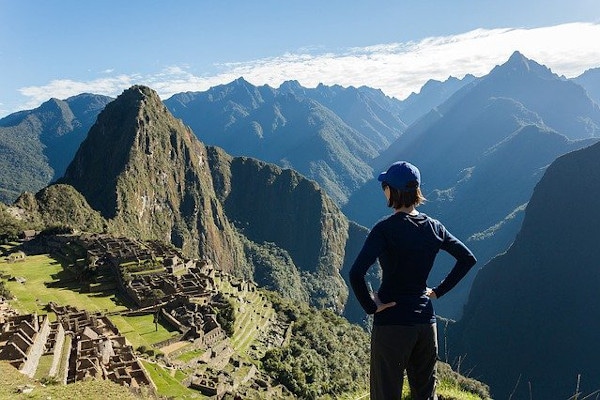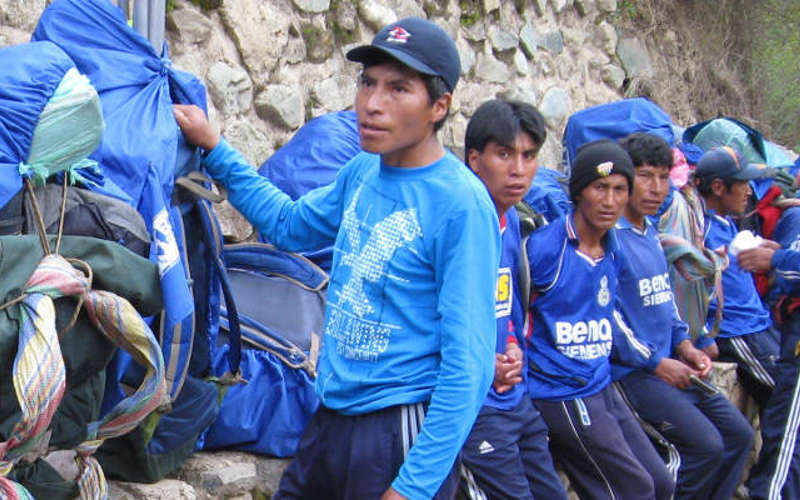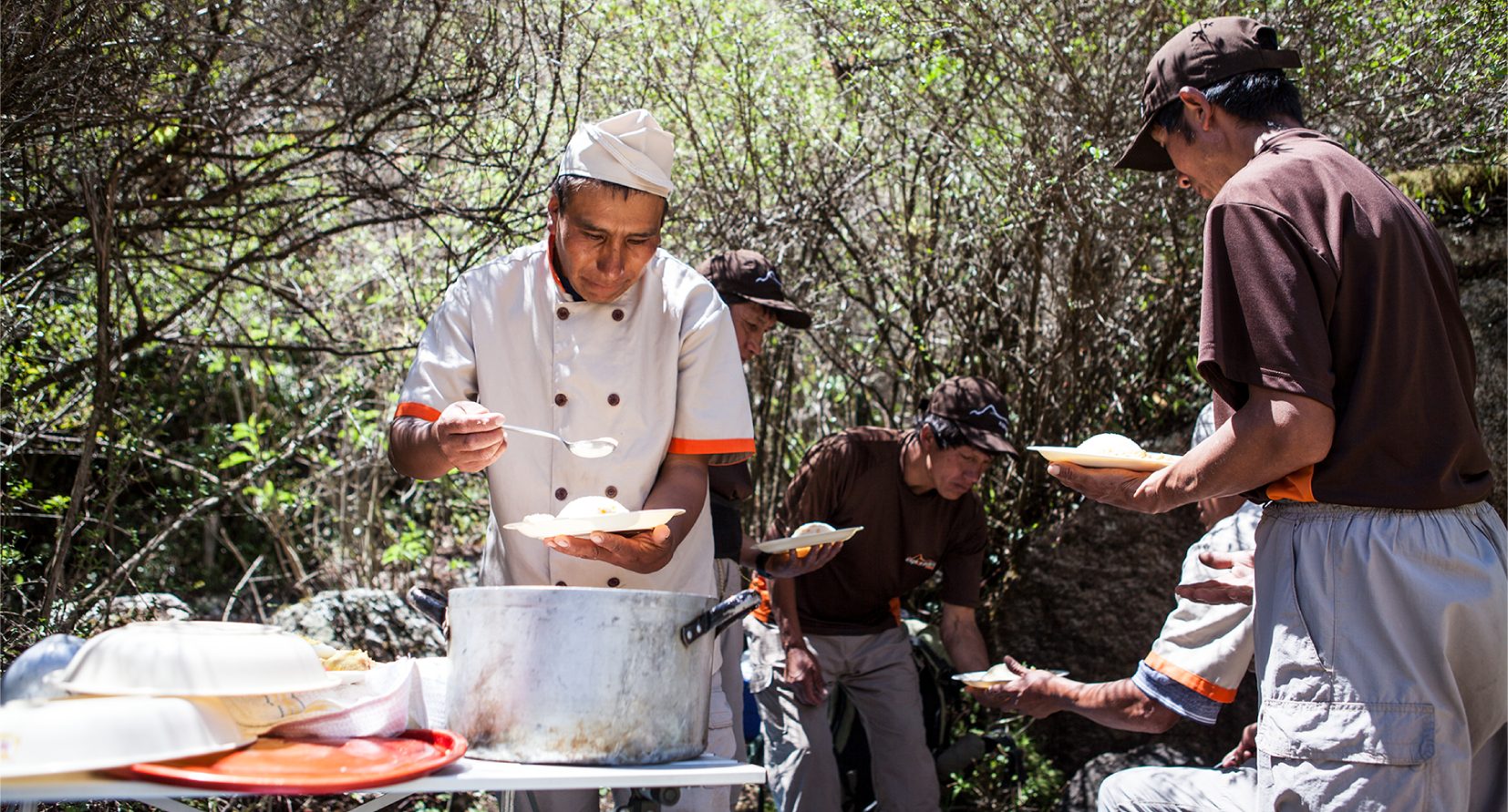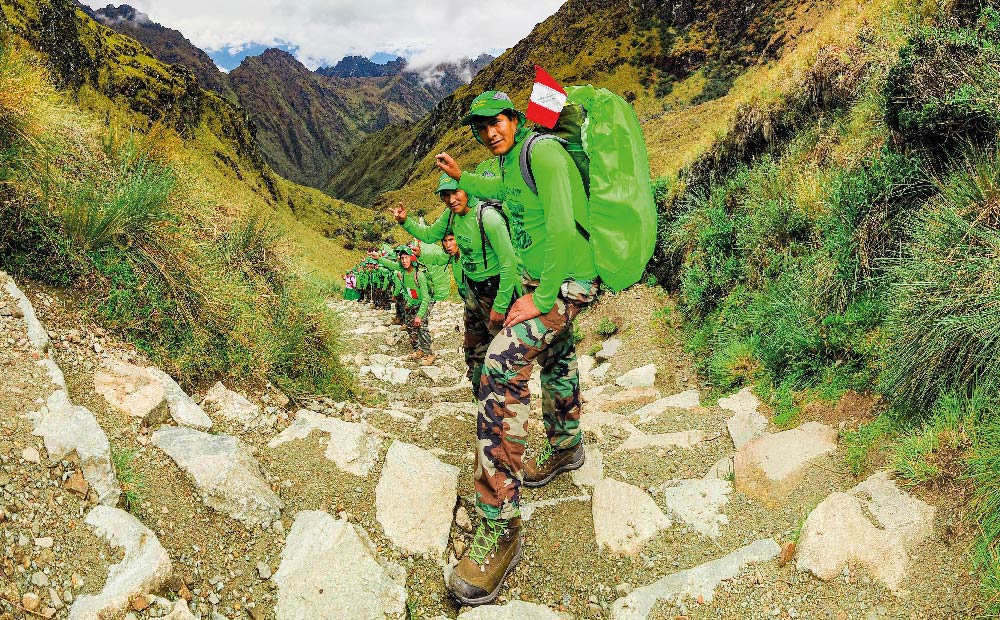Trekking to Machu Picchu is an incredible experience. The stunning scenery, mountain vistas and, of course, the history of the trail, makes it quite simply one of the most popular tourist destinations in the world.
Because of its popularity, the Peruvian government have had to initiate certain schemes to protect the Inca Trail. The most notable of which is that only 500 trekkers are allowed on the trail on any given day and that any trekker wishing to hike the Inca Trail must be accompanied by a guide and porters.
Because of this, I often get asked by readers 'how much should I tip porters?' and 'Are the porters treated fairly?'.
To answer this, I have decided to write on the subject as tipping on the Inca Trail and porter welfare are by no means crystal clear subjects.

Get a Machu Picchu trek quote
Start planning your Machu Picchu hiking holiday.
Tipping on the Inca Trail
At some point during your trek, I can guarantee you'll be puffing and breathing hard (there are a lot of stairs!). It's normally at these points when you realise that your porter has gone on ahead of you and carrying all your bags and gear, not to mention the camping and cooking equipment.
They do this with no fuss and are often happy to give you a boost along if you need it. When you arrive at your campsite, you'll find all your tents set up and a nice hot meal on the way.
Naturally, it's important to thank these guys for their efforts as they make the whole trekking experience far more relaxed and easy. Along with your thanks, tipping porters on the Inca Trail is a common practice and one that all tour operators encourage.
However, tipping porters in Peru is not as straight forward as one might think. Unlike many other popular trekking destinations like Mount Kilimanjaro and Nepal, there is no set (or standard) amount for tipping your porters.
So, how much do you tip them?
The first thing to make clear with tipping on the Inca Trail is that if you are not happy with how the guides, chefs or porters have performed on your trek, you are not obliged to tip them. Porters soon realise their service is not up to scratch if they receive minimal tips.
Tipping should be solely dependent upon how good you thought the quality of service was. If you think certain people performed their job well and others did not, you are advised to simply tip the people whom you thought deserved it.
I always advise that you take plenty of small change so that you can give each porter your tip personally.
Here are some of my recommendations for tipping on the Inca Trail:
- Porters - 70-100 soles ($18-$25) each. This equates to 25 soles ($6) per day.
- Chefs - 170-220 soles ($45-$55) each. This equates to 45-55 soles ($12) per day.
The trekking group can pool this together, but should remember that each person will generally have at least 2 porters carrying their stuff including food, toilets, camping gear and personal effects. There will generally also be 1-2 chefs who prepare your meals.
Please Note: Try to avoid giving all your tips to the guide or chef in the hope that they will distribute the tips fairly among the porters. This is rarely the case and the guide will usually take the lion's share if you do this.
It's advised that you don't ask a porter how much he gets paid as you are unlikely to get a straight response. A porter that gets paid well will usually state otherwise and porters who get paid very little are often instructed by their employees to not state this to clients.
Porter Welfare
Sadly, porter mistreatment is a common practice on the Inca Trail. Therefore, porter welfare is super important and something potential hikers should take into account before trekking.
This is why Inca Trail operators can charge significantly different prices as many operators pay their porters below the national minimum wage.
So, how can you help?
Here are my 7 top tips in dealing with porter welfare and tipping on the Inca Trail.

1. Book with a responsible trekking operator
How do you know which operators treat their porters fairly? This is a difficult problem without a simple answer. I will say this much though: if an operator is charging significantly less than others, then this is a sure sign their porters are being unfairly treated.
Thanks to the Peruvian government, there is a national minimum wage for porters.
Sadly though, many trekking operators choose to ignore this to bring down their prices. If a standard group booking for a 4-day Inca Trail trek costs less than US$500, be very wary.
If you are concerned, I always recommend asking a tour operator directly about their porter treatment and wages. You'll usually get a good idea from the answer you receive, whether it be an open answer or a cagey one.
On the flip side, due to overseas insurance policies, western operators almost always treat their porters fairly. With that said, you will pay slightly more for this peace of mind.
See more info on our recommended tour operator.

2. Hire a porter on top of a guide
Hiring a porter as well as a guide will make your trek far easier and thus, more enjoyable. Not only will you have less to carry and more time to admire the scenery, but you'll be supplying employment to local people who need it.
3. Talk with your porters
Porters will usually not speak until you choose to speak to them. The reward is to learn about their way of life and local culture. Porters often have great stories about old traditions and will often sing traditional songs for you over a nice cup of tea.
4. Show your porter proper respect
Always thank your porter verbally along with a tip. Make them feel valued and try to engage with them along the trek.

5. Consider the Porter Weight Limit
By law, porters are only allowed to carry a maximum of 20 kg (44 lbs.) on the trail and 5 kg (11 lbs.) for personal gear. To ensure this happens, porters are weighed at the entrance point and then at Wayllabamba on the second day.
Although the regulation is strictly enforced, less ethical operators still find ways around this restriction. Often, guides and helpers will take luggage as they go through the checkpoints and then hand them off to the porters once they are safely away.
Also, many tour operators restrict porters' personal gear allowance so that they can load their porters up further.
Please Note: If you notice any of these things happening to porters during your trek, make sure you report it immediately to your guide and the tour company itself if the issue isn't resolved expediently.
6. Consider porter working conditions
A major difference between a good operator and a poor one is how they treat their porters. Companies will often only feed their porters the leftovers of what is not eaten by the trekkers. This inevitably means that many porters eat extremely little and finish the trek both tired and hungry.
Porters usually sleep together in large dining tents. However, when it rains, the floor of these tents become drenched and freezing and good tour operators will provide floor mats and bedrolls for their porters.
Please Note: Bear in mind that the later you stay up talking and drinking in the dining tent, the longer the porters have to sit outside in the cold and wait to go to bed. So, do your best to be considerate of the people carrying your necessities and camping equipment during these long treks.
7. Report Porter Mistreatment
If you notice any porter mistreatment, you need to report this to your guide immediately. If your guide does not resolve the problem, then it is up to you to complain forcibly to the office manager on your return.
If you want to make a big impact, do this when the office is full of potential trekking clients.
Alternatively report incidents to the Regional Federation of Porters 'Camino Inca Daniel Estrada Perez' (RFP), or to the three main Inca Trail tour operators associations (AATC CUSCO, ASSORCIC, or the Association de Operadores de Turismo Ecologica de Cusco).

Get a Machu Picchu trek quote
Start planning your Machu Picchu hiking holiday.
Conclusion
I hope you found this article helpful. If you have any further questions about tipping on the Inca Trail or porter welfare, please leave us a message in the comment section below and we'll respond as soon as possible.

Hi Mark thank you for the useful tips and advice on this site. Having recently completed Mt. Kilimanjaro with a group of friends, we have decided to embark on another adventure together in 2026 and have chosen Machu Picchu. So since confirming this, I’ve been doing a lot of reading and understanding more about what to expect etc. More importantly, the company that provides these tours. We have been recommended Cusco Native Tours for our upcoming travel. Is this a reputable company that you know off, and treat their staff (porters, guides, chefs etc) fairly? I’ve visited their websites, read up their reviews on Tripadvisor, but I am keen to find out more on how they work with their staff. Is there a link that lists reputable companies that do the these treks? Many thanks in advance!
Hi Michelle, thanks for getting in touch. I’m not familiar with Cusco Native Tours, but in general the local companies in Peru are a lot better regulated than in Tanzania, especially ones that operate the Inca trail. I recommend booking on Skyhook, where we’ve vetted local guides and prices are very competitive. See Machu Picchu trek options here: https://www.skyhookadventure.com/go/machu-picchu
Hi Mark.. looks like you might have a error regarding the Porters tip rates… especially as your post is related to Porter welfare, and was updated to reflect 2019…
These guys are the backbone of the trek, receive severely low salaries and are often disadvantaged due to lack of both Spanish + English, shyness of the campesino lifestyle and generations of systemic down-trodding.
Recommended tip rates for Porters should be 60-80 soles PER Porter ($20-$26). This equates to 20 soles per day …($7).
Recommended tip for Chefs should be 150-180 soles Per Chef ($50-$60). This equates to 38-45 soles per day …($7).
The group can pool this together, but should remember that each person will generally have at least 2 porters carrying their stuff including food, toilets, camping gear and personal effects. There will generally also be a 1-2 chefs.
Of course tipping is voluntary, but seeing as many of them work crazily hard to make this trip as enjoyable, safe and easy as possible for tourists, we should at least show our gratitude.
Hi Michelle, many thanks for pointing this out, you’re 100% correct. I have updated the tipping values accordingly. All the best!